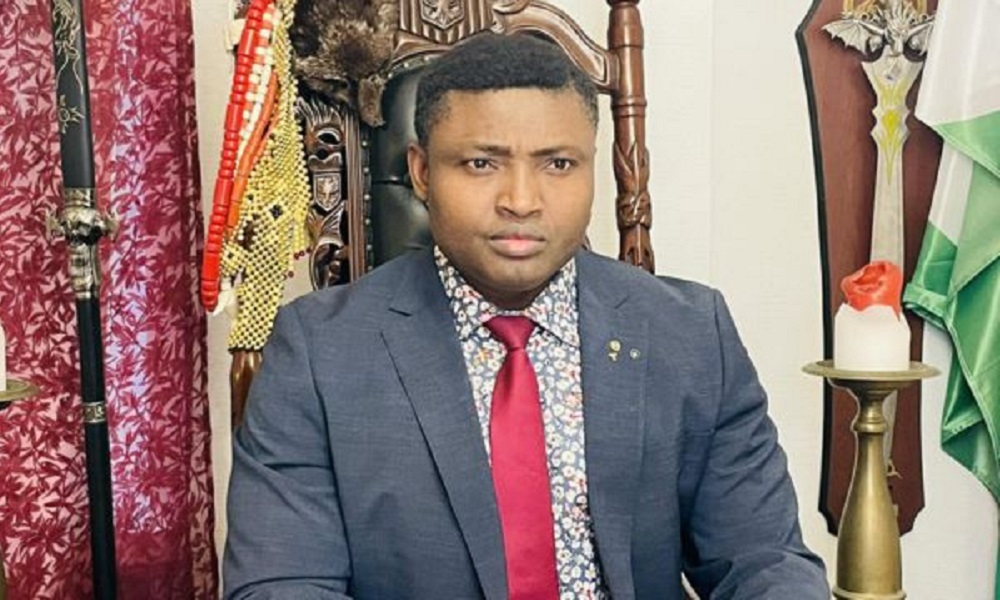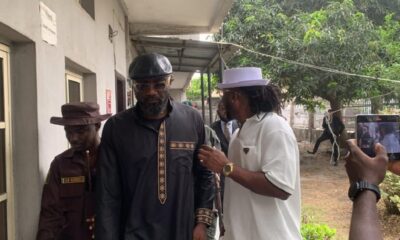News
FG declares Simon Ekpa, 15 Others as Terrorism Financiers

The Federal Government has officially designated Simon Ekpa and 15 other individuals as terrorism financiers. The government also declared the Lakurawa Sect as a terrorist organization and a terrorism financier.
These actions were taken following their alleged involvement in funding and supporting terrorist activities.
The announcement came on Thursday, March 6, 2025, after the Nigeria Sanctions Committee (NSC), an independent body led by the Attorney General, recommended the designation. The Chairman of the NSC subsequently directed the inclusion of Simon Ekpa Njoku and others on the Nigeria Sanctions List.
According to the government, the decision was made in line with Section 54 of the Terrorism (Prevention and Prohibition) Act, 2022. Under this provision, all financial institutions and certain businesses are now required to immediately freeze, without prior notice, all funds and assets linked to the designated individuals and entities. They must also report any such frozen assets to the Secretariat of the Nigeria Sanctions Committee.
Additionally, any financial transactions involving these individuals must be flagged and reported to the Nigerian Financial Intelligence Unit (NFIU). The law mandates strict compliance, warning that failure to adhere to these measures could result in both criminal and civil penalties, as well as reputational risks for financial institutions and businesses.
Simon Ekpa Njoku, who was identified as a key financier of terrorism, was born on March 21, 1985. He reportedly facilitated at least 49 fundraisers in different countries between October 2023 and September 2024. Authorities claim that through his social media platforms, particularly X (formerly Twitter), he ordered attacks on government buildings, military bases, and paramilitary posts across southeastern Nigeria. These attacks reportedly resulted in significant loss of life, including security personnel and civilians, as well as widespread destruction of government and public property.
Ekpa’s address was listed as Kauppakatu 6 B, Zip: 15140, Lahti, Finland, with international passport number FP2927082. His known contact numbers include +35803555858 and 08063892983.
The government also designated several other individuals as terrorism financiers, based on intelligence reports linking them to the funding of terrorist groups.
Godstime Promise Iyare, born on May 20, 1996, was identified as a key figure in local fundraising activities supporting terrorism. Authorities traced his involvement through a United Bank for Africa (UBA) account, 2212655102, which was allegedly used to collect funds from supporters in Nigeria. Security agencies also discovered that his mobile phone number was linked to the National Identity Numbers (NIN) of two other individuals—Chukwuekwu Iyare and Helen Ugbomor Lovelyn Iyare.
Francis Chukwuedo Mmadubuchi, born on September 27, 1987, was also listed. Investigators reported that his Moniepoint account, 8196060258, received donations from members of the Indigenous People of Biafra (IPOB).
John Anayo Onwumere, born on March 5, 1987, was identified for using a Sterling Bank account, 0026224269, to receive funds from IPOB supporters. Similarly, Chikwuka Godwin Eze, born on May 5, 1975, was named for operating an Access Bank account, 0108595489, that allegedly served as a collection point for contributions from members of a group identified as Odumegu State Defacto and Urhobo Isoko State Defacto.
Another person listed was Edwin Augustine Chukwuedo, born on May 27, 1983, whose Flutterwave account, 9461730261, was allegedly used to channel funds for terrorist activities. Chiwendu Joy Owoh, born on February 10, 1982, was accused of helping to organize financial contributions within Nigeria through a Moniepoint account, 6474876289.
Ginika Jane Orji, born on October 5, 1995, was also placed on the sanctions list. Her Opay account, 8039231985, was reportedly used to collect funds from IPOB members in local chapters across Nigeria.
Awo Uchechukwu, born on December 11, 1978, was declared a terrorist financier and identified as a commander of the Eastern Security Network (ESN). Authorities allege that he received direct funding from Simon Ekpa to finance the group’s activities. His First Bank account, 3060144916, was cited as a major financial channel.
Other individuals listed include Mercy Ebere Ifeoma Ali, Ohagwu Nneka Juliana, Eze Chibuike Okpoto, and Nwaobi Henry. Intelligence reports linked their bank accounts in Access Bank, UBA, and other financial institutions to transactions supporting terrorist organizations.
The Nigerian government clarified that the asset-freezing mechanism is a preventive tool designed to disrupt terrorist activities by cutting off financial support. Financial institutions and businesses have been warned that failure to comply with these sanctions could lead to legal consequences.
Authorities have instructed banks and other financial service providers to identify and freeze all assets owned, controlled, or associated with the designated individuals and groups. This includes funds in accounts owned jointly or indirectly by them, as well as those managed on their behalf by third parties.
Additionally, businesses and institutions must continue to monitor transactions for any links to the sanctioned individuals and report any findings to the Nigeria Sanctions Committee at [email protected].
The Nigerian government has reiterated its commitment to fighting terrorism and has vowed to take strict action against individuals or entities found supporting terrorist groups through financial means.
News
Nigeria Needs To Focus on Local Solutions to Fight Poverty – Speaker Abbas

By Gloria Ikibah
Speaker of the House of Representatives, Rep. Tajudeen Abbas, has said the fight against poverty in Nigeria must start at the community level.
Representatives by the Chief Whip of the House, Rep. Isiaka Ibrahim, at the inauguration of a new House Committee focused on community and social development on Wednesday, Abbas stressed that real change will only happen when policies are designed to meet the everyday needs of people in towns and villages.
He also called on the government to create people-friendly programmes that reduce the gap between the rich and the poor.
The event, held at the National Assembly in Abuja, marked the official takeoff of the Committee on Community and Social Development Agency/NG-Cares. Abbas urged members of the Committee to approach their work with honesty and a genuine desire to help struggling Nigerians.
News
White smoke rises, new pope elected at Vatican +Video

By Francesca Hangeior
White smoke billowed from the chimney of the Sistine Chapel on Thursday, signalling that cardinals locked inside have elected a new leader for the world’s 1.4 billion Catholics.
Thousands of pilgrims and curious onlookers in St Peter’s Square cheered and applauded as the smoke appeared and bells began to ring, indicating the 2,000-year-old institution has its 267th pope.
All eyes now turn to the balcony of St Peter’s Basilica to see who has been elected to succeed Pope Francis, an Argentine reformer who died last month after 12 years as leader of the worldwide Church.
The new pontiff will be introduced in Latin with his chosen papal name and address the world for the first time.
He faces a momentous task: as well as asserting his moral voice on a conflict-torn global stage, he faces burning Church issues from the continued fall-out from the sexual abuse scandal to the Vatican’s troubled balance sheets.
Some 133 “Princes of the Church” from five continents — the largest conclave ever — began voting on Wednesday afternoon.
Sworn to secrecy, on pain of excommunication, their only means of communicating their progress to the outside world was by sending up smoke through the chimney of the Sistine Chapel.
On Wednesday evening and then again on Thursday lunchtime, the smoke was black, emitting disappointed sighs from the tens of thousands watching.
But on Thursday afternoon just after 6pm (1600 GMT) the smoke emitted was white, confirming that the Catholic Church has a new spiritual leader.
By tradition, he now enters the Room of Tears — where freshly-elected popes give free rein to their emotions — to don a papal cassock for the first time, before returning to the Sistine Chapel so the cardinals can pledge their obedience.
He will then appear on the balcony along with a senior cardinal, who will announce to the waiting crowds “Habemus Papem” (“We have a pope”).
The pope will then give a short speech and impart his first “Urbi et Orbi” (“To the City and the World”) blessing.
The election has come at a time of great geopolitical uncertainty, which was seen as a key voting issue, along with the rifts within the Church.
Francis was a compassionate reformer who prioritised migrants and the environment, but he angered traditionalists who wanted a defender of doctrine rather than a headline-maker.
Some 80 percent of the cardinal electors were appointed by Francis. Hailing from 70 countries around the world, it was the most international conclave ever.
That was no guarantee, however, that the cardinals would pick someone in his vein.
The question was whether to choose a pastor or diplomat, a liberal or conservative, someone versed in the Curia — the Church’s governing body — or a relative outsider from areas of the world where Catholic faith is thriving.
Before the cardinals were locked into the Sistine Chapel Wednesday, their dean Giovanni Battista Re urged them to choose someone able to protect the Church’s unity.
The next pope must also be able to lead “at this difficult and complex turning point in history”, amid raging conflicts around the world and the rise of ultra-nationalist parties.
The Church has also had difficulty in adapting to the modern world, with declining priest numbers and increasingly empty pews in the West.
The papal inauguration usually takes place less than a week after the election with a mass celebrated before political and religious leaders from around the world.
The new pope will likely do a tour of St Peter’s Square in his popemobile for the first time, before delivering a homily outlining his priorities.
News
Meet the new Pope, Pope Leo XIV +Photo

By Francesca Hangeior
Formerly Cardinal Robert Francis Prevost, he hails from the United States and is the first American to be elected pope in the history of the Roman Catholic Church.
A member of the Augustinian order and former Prefect of the Dicastery for Bishops, Pope Leo XIV brings decades of pastoral and administrative experience to the papacy.
He is a moderate who was close to Pope Francis and spent years as a missionary in Peru, he becomes the Catholic Church’s 267th pontiff, taking the papal name Leo XIV.
-

 Entertainment15 hours ago
Entertainment15 hours agoI’m broke yet accused of money laundering – VDM breaks silence after EFCC release
-

 News2 hours ago
News2 hours agoBREAKING! Finally, White Smoke Emerges From Sistine Chapel as Vatican Elects New Pope
-

 News7 hours ago
News7 hours agoBreaking: Three Serving PDP HoR Members Defect to APC
-

 News15 hours ago
News15 hours agoEdo police rescue kidnapped PDP chairman, 36 others
-

 News15 hours ago
News15 hours agoTomato Ebola Causes Loss of N1.3 Billion, Contributing to Rising Food Prices
-

 News6 hours ago
News6 hours agoEx-Governor Uduaghan, Daughter Dump PDP, Join APC
-

 News8 hours ago
News8 hours agoFinally, IMF deletes Nigeria from its debtors list
-

 News16 hours ago
News16 hours agoSad! Five members of one family die of food poisoning


















